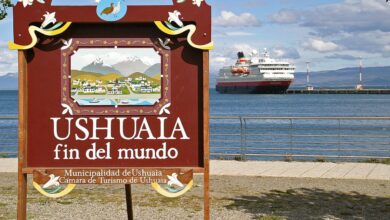Balance of the COP2 of the Escazú Agreement: More Participation is Urgently Needed
From April 19 to 21, a meeting was held in Argentina with the representatives of the Member States of the Escazú Agreement to define critical issues in the implementation of this agreement, whose heart is the protection of environmental defenders.

Photo: TW-LacP10info
LatinAmerican Post | María Fernanda Ramírez Ramos
Listen to this article
Leer en español: Balance de la COP2 del Acuerdo de Escazú: urge más participación
The entry into force of the Escazú Agreement was two years old and left a bittersweet balance. Although it is the first international Treaty recognizing Latin American States' responsibility to protect environmental defenders, there are still many challenges to overcome, including the ratification of the agreement by crucial countries such as Brazil or Colombia. An extraordinary conference was held in this panorama from April 19 to 21. This is the second Conference of the Parties (COP2) of the Escazú Agreement, which took place in Buenos Aires, Argentina. Its primary purpose was to define the Plan for the Protection of Environmental Defenders and elect the first seven members of the Committee to Support the Application and Compliance with the Treaty.
The Escazú Agreement has environmental justice as its framework. On the one hand, it aims to guarantee access to information and citizen participation in the ecological processes of the continent. Likewise, it is vital in defense of the rights (and life itself) of environmental defenders. It is necessary to remember that the region has the highest number of murders of environmental defenders. Statistics from the Global Witness organization indicate that 68% of the deaths of ecological leaders reported in the last decade occurred in Latin America, with countries such as Colombia, Brazil, and Mexico being the most dangerous for these defenders.
We recommend you read: G7: do the big seven lack decision and commitment to climate change?
Balance of the COP2 in Escazú: more Countries, more Cooperation
COP2 of the Escazú Agreement participated in "15 delegations of State Parties, eight delegations of observer countries, 357 representatives of the public, 110 government delegates, 74 representatives of the United Nations and international organizations (with more than 600 accredited persons). In total)", according to information from ECLAC. These States Parties are Argentina, Mexico, Chile, Uruguay, Antigua and Barbuda, Belize, Grenada, Bolivia, Ecuador, Guyana, Nicaragua, Panama, Saint Vincent and the Grenadines, Saint Lucia, and Saint Kitts and Nevis.
The conference closed with a call to the member countries to deepen the treaty's implementation, as well as an invitation to the other countries to speed up the ratification and accession of the treaty. There must be greater cooperation in the region to protect environmental defenders, provide better access to information, and have more citizen participation. At the same time, it is essential to strengthen national capacities and regional alliances to provide more outstanding guarantees to exercise the rights related to environmental justice.
The event generated the "Declaration of Buenos Aires," highlighting the start-up of the Voluntary Contributions Fund with an initial contribution from Mexico and the announcement of a donation from Chile. Likewise, the election of the Enforcement and Compliance Support Committee members was made official. This was made up of Guillermo Eduardo Acuña (from Chile); Mariana Blengio Valdes (Uruguay); Rita Leonette Joseph-Olivetti (Grenada); Patricia Madrigal Cordero (Costa Rica); Andrés María Napoli (Argentina); Carole Denise Angela Stephens (Jamaica); and Félix Wing Solís (Panama).
Challenges for the Implementation of Escazú
Brazil, Colombia, Costa Rica, Dominica, Guatemala, Haiti, Jamaica, Paraguay, the Dominican Republic, and Peru have yet to ratify and adhere to the Treaty of Escazú to become States Parties. The speed these countries give to ratification in their respective congresses plays a fundamental role in the short term.
Bishnu Tulsie, a delegate from a group of public representatives, noted the importance of the victims of environmental injustices being heard in this Agreement. "We congratulate the elected members of the Committee to Support the Application and Compliance with the Agreement since they will play a significant role: many of the cases are brought by the public and the victims, and for this reason, it is relevant to develop guidelines on how the cases or problems can be brought before the Committee. There must be capacity building so that people know the procedure for that," he explained during the conference.
Real Citizen Participation
One of the most worrying issues regarding the Escazú Agreement is that effective processes are achieved so that those who make the decisions hear valid citizen participation and the needs of the communities. Aída Gamboa, a representative of the Escazú Ahora citizen platform, emphasized this issue. "We hope candidates who have demonstrated their commitment to the Agreement will be chosen. That they have not only the support of the States but also other civil society actors. These indigenous communities are people with legitimacy," he said before the election of the Committee.
In fact, at the beginning of the event, demands were made by environmental groups towards ECLAC and the States' Parties to Escazú. Organizations grouped in the Climate Action Network Latin America (CANLA) and the Escazú Regional Network have now issued a statement demanding greater transparency and participation in decision-making. In the information, they point out that there were restrictions on citizen participation before the event, which go against the spirit of the Agreement.
"First of all, the short time that people not part of official delegations from countries had to register led to many interested organizations being left without the possibility of participating. On the other hand, it was also provided that the Candidates to be part of the Committee to Support Application and Compliance will not be able to participate in certain instances of the COP, which means a veto against them," the statement said.
On the other hand, representatives of different indigenous communities, critical actors in protecting diverse environments, have raised proposals to promote greater participation for indigenous peoples. Creating unique participation mechanisms for them would be necessary.
Finally, it is necessary to remember that correctly implementing the Escazú Agreement is a matter of protecting life and human rights.




